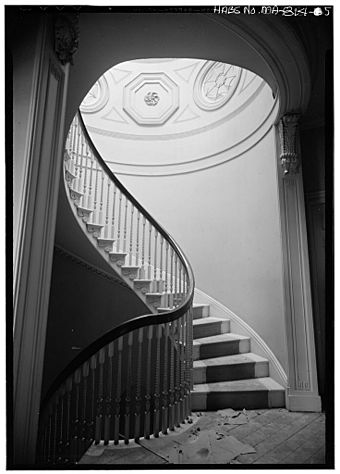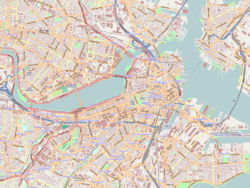Nathan Appleton Residence facts for kids
|
Nathan Appleton Residence
|
|
|
U.S. Historic district
Contributing property |
|

Interior, Parker House
|
|
| Location | Boston, Massachusetts |
|---|---|
| Built | 1821 |
| Architect | Richard Walsh, Alexander Parris |
| Part of | Beacon Hill Historic District (ID66000130) |
| NRHP reference No. | 77001541 |
Quick facts for kids Significant dates |
|
| Added to NRHP | December 22, 1977 |
| Designated NHL | December 22, 1977 |
| Designated CP | October 15, 1966 |
The Nathan Appleton Residence is a really old house in Boston, Massachusetts. It's also called the Appleton-Parker House. You can find it on Beacon Street in the Beacon Hill area.
This house is special because it was home to Nathan Appleton. He was a very important person who helped start many textile factories. These factories made cloth. The house is also famous because Nathan's daughter, Frances, married the famous poet Henry Wadsworth Longfellow here in 1843. Because of its history, it was named a National Historic Landmark. A famous architect named Alexander Parris designed this house in the early 1800s.
What the House Looks Like
This building is actually two houses joined together. They are made of brick and have three floors. A shared wall, called a firewall, separates them. When they were built in 1821, they looked almost exactly alike. They only had small differences inside.
Each house has three main sections on the front. The outer section on each side is rounded and has two windows. The front door for each house is in the middle section. It has a fancy wooden frame and a fanlight, which is a window shaped like a fan above the door. A small porch with columns, called a Doric portico, covers the entrance.
At the very top of each building, there is a low fence-like structure called a balustrade. This hides the gently sloped roof. In the 1870s, a fourth floor was added to the houses. The original balustrades were kept in place. Later, in the 1880s, the rounded sections of house number 39 were changed. A third window was added to each floor. Also, small rooms at the back of each house, which were for servants, were made taller. They were raised to three stories by later owners.
History of the Appleton House
The land where the house stands was once owned by a painter named John Singleton Copley. Later, a lot of this land was bought by Dr. John Joy. He ran a company that bought and sold land.
In 1819, Nathan Appleton and his business partner, Daniel Pinckney Parker, bought an older house that was on the property. They tore it down. Then, they had the twin houses built. The architect Alexander Parris designed them. These houses were given the numbers 39 and 40 Beacon Street.
In 1843, Nathan Appleton's daughter, Frances (also known as Fanny), got married in this house. She married the famous poet Henry Wadsworth Longfellow. Nathan Appleton was a very smart businessman. He helped fund the Boston Manufacturing Company. He also created a plan for selling the products they made.
Because of this early success, he helped build large factory areas in other cities. These included Lowell and Lawrence, Massachusetts, and also Manchester, New Hampshire. Nathan Appleton lived at 39 Beacon Street from 1821 until he passed away in 1861.
From 1914 until the 1990s, the house was home to the Women's City Club of Boston. Since then, it has been divided into smaller apartments called condominiums. The house was named a National Historic Landmark in 1977. It is also listed on the National Register of Historic Places.
Images for kids





